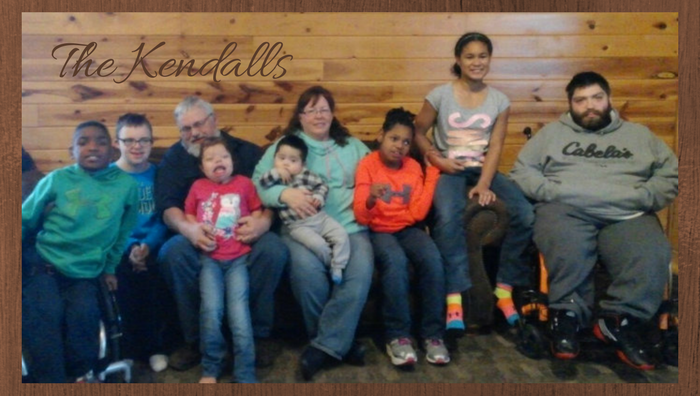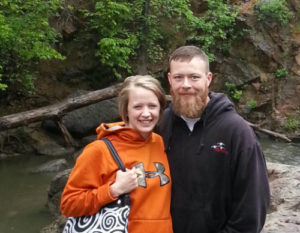During National Birth Defects Prevention Month, we may be tempted to think only of the problems that birth defects cause. By doing so, we can overlook the power of a child born with defects to transform a family.
At Choices Pregnancy Center we talked with Marcus Kendall, whose parents welcomed children with birth defects like Down syndrome and spina bifida— along with other special needs—into their family.
Here’s his story.
Experiencing life with birth defects

CHOICES: Marcus, in your family, what words do you use to describe your siblings with birth defects?
MARCUS: We typically use the term “special needs.” They’re all just fantastic kids. These kids can have long, full lives. It does take extra work by primary caregivers and PCAs, but the work is worth it because you see some amazing progress. They need someone to love them. My family has done an excellent job doing just that. They’re “special needs” kids but they’re special kids.
You just don’t know the impact that a child that is developmentally delayed, or that has a birth defect, can make on you in a positive way. I’m completely convinced that God has used my parents’ calling to transform them, to transform the rest of us—my family and the greater community—because of it. To steal a quote from Rick Warren, “I believe in accidental parents, but I don’t believe in accidental children.” I firmly believe God has put us in this position to grow us and to provide love for these children for His purpose.
Down syndrome, spina bifida, Pfeiffer syndrome--they're 'special needs' kids, but they're special kids. Click To TweetCHOICES: Tell us about your adopted siblings.
MARCUS: We adopted Jaden at 4 ½ months. He had spina bifida; he still does.
Jonathan was next, who was a Down’s baby.
Then came a sibling group. Neither of them were born w/ special needs. Shayna had a traumatic brain injury—very severe. That was in state news. We adopted her with her younger sister Kiana, who had to witness those things, so there’s some emotional trauma. Shayna unfortunately died at the age of four. But we’re convinced that God used that situation as well; Shayna stayed around long enough to find her sister a home, and a family that loved her.
Sara was next. She had Shaken Baby Syndrome; she has a lot of difficulties, but she’s happy and she’s grown a lot. Will she ever be able to function on her own? No. But she’s full of personality.
Then we adopted Robert. Robert is another spina bifida kid. He is absolutely a handful. He has so much energy, it’s tough to describe.
We’ve had a foster child for a good long while; the adoption papers will wrap up soon. She has Pfeiffer syndrome. That is kind of a blanket term for neurological disorders—many, many, many. I think when we took her in, she had already had 80 surgeries. She has blossomed in a way that I never would have thought possible.
Mom and Dad just recently came home with Noah from CA, another Down’s baby. He’s 19 months. I’m thinking they might be done, but I’m not certain. The house is kind of a zoo, between kids and nurses and all of that stuff. That’s the zoo they’ve been called to.
What is it like, day after day, dealing with birth defects?
CHOICES: Among your siblings with birth defects, Jaden and Robert had spina bifida. Can you tell me about that?
MARCUS: With spina bifida, a child is born with their spinal cord not contained in their spine. Typically, what goes along with that is hydrocephalus (water on the brain), paralysis—Jaden is paralyzed from the knees down, and Robert is pretty much right in there as well. Depending on the level of pressure on the brain, there are spectrums, so to speak, that depend on how they’ve been able to alleviate that pressure. Both of them have shunts that drain the water down into their abdominal cavity.
CHOICES: Does that require frequent doctor visits?
MARCUS: Oh, yeah. A shunt can plug at any time. Jaden’s had a lot of surgeries; I’ve lost track. He had to have the front of his skull removed to let the pressure go down; he’s been split from the back of his neck down to his tailbone to run hoses, so to speak. There can be a lot of surgeries. I think medical technology has come a long way in the last 15 years. With laparascopic surgery it’s gotten a lot better. That was Mom and Dad’s introduction into kids with special needs: major surgeries and some real crisis moments. That was tough. But we have a fantastic team of doctors that we’ve developed an 18-year relationship with.
CHOICES: What kinds of support has your family found to help them with these huge expenses and the emotional drain?
MARCUS: In terms of medical expenses, with adoption of special needs kids, Medical Assistance is there. I guess me being a child of my folks, I don’t know the finance end of things. I know that there should be more support. But at the same time you’re also so busy doing life and learning to maintain homeostasis, that it’s tough to shuttle off a special needs kid or get him loaded into the van and do some of those sorts of things. That is a difficult thing. But it’s absolutely worth it in the long run.
How do special needs siblings influence your family?
CHOICES: You’ve said your siblings have these huge challenges, and yet they’re these fantastic kids. Can you paint a picture of what’s that like, as you observe them?
MARCUS: They’re just like any other kid. They want to play, they want to learn, they are just fantastic kids. I think the reason special needs kids are so special, is they have so much more to overcome and yet they manage to maintain a joyful demeanor. So it forces the rest of us to look at what we go through on any given day, and we have to say, “I have less to overcome, and yet I don’t have the joy they have.” It really puts things into perspective.
CHOICES: What is the source of that joy for your siblings?
MARCUS: I think each of us has a God-given desire to love and be loved. When the emotional needs are met, the physical needs are met, when those safety needs are met, because they’re in a safe spot and they don’t have to worry about all the stuff of life, they’re just full of joy.
And sometimes it is more simple. Jonathan, being a Downs kid, it is a more simple sort of life. He has a fantastic personality, the same as other kids. He does his thing, and he’s stubborn, and there’ll be times when he gets angry, but he just seems to enjoy life. It really gets you a little envious in that they enjoy life so much. It almost becomes— You think you’re doing something for them, and they’re really doing so much more for you.
CHOICES: How has your experience with your adopted siblings influenced your opinion about the value of life?
MARCUS: Scripture definitely speaks to “You knew me in my mother’s womb.” And as I said before, I don’t believe in accidental children. I was doing research for a sermon I was writing, and I stumbled onto a statistic that shocked me. It stopped me in my tracks. I haven’t been able to find it again. It said 90% of children diagnosed with spina bifida or Down syndrome prior to birth are aborted. [1. Some research indicates that the number of babies aborted due to a prediction of Down syndrome is actually closer to 67%. See this article: http://www.lifeissues.org/2015/09/make-second-mile-less-scary/ ]
I know the amount of joy my family has because of having those 4 boys in our life. And to think that just based on numbers, if each one of those [boys] represents 10%, there are 36 others who didn’t come into the world. That is incredibly sad, that those kids never got the opportunity to bless somebody else because they might have been “too much work” or “my family will look different” or “it’s not what I had planned for my life.” I don’t know anyone who can say that their life is what they planned.
Birth defects not what you had planned? Can anyone say their life is what they planned? Click To TweetWhat does it take to parent special needs children?
CHOICES: Say someone is reading this, and they’ve just found out their child has the likelihood of having birth defects. What traits could help them be ready to adventure on with kids with birth defects?
MARCUS: I automatically go back to Scripture. “These three remain: faith, hope and love. And the greatest of these is love.”
That love motivates us to do the hard work. Nobody wants to discipline their children. But because we love them, we have to discipline them. We have to establish boundaries, we have to say, “Even though you are special, no still means no.”
Even though medically there are some challenges, we’re not just going to say, “Be content existing.” Let’s do the physical therapy, let’s do the speech therapy. Let’s do those sorts of things because they can. They need someone who loves them, who is attached to them, to help them in that process. The nurses, they come and spend time with my siblings, and they do a great job at those things, too. And there is no substitute for Mom and Dad doing it.
It’s going to take determination. It’s going to take patience. And a lot of times those are traits that are learned, not necessarily imparted.
At the time of this interview, Marcus Kendall served as senior pastor at Cornerstone Christian Church in Redwood Falls, MN. He and his wife Lori enjoy spending time together outdoors, camping and fishing. He has 2 siblings by birth; his 6 (going on 7) siblings by adoption range in age from 19 years to 19 months.
__________


